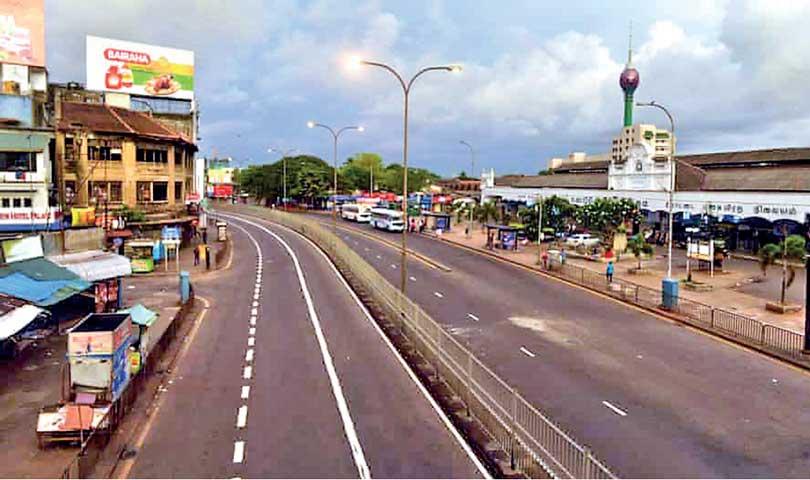24 Aug 2021 - {{hitsCtrl.values.hits}}
Kneejerk economic measures could lead to ‘long Covid’

 In early May this year, the Institute of Health Metrics and Evaluation (IHME), a Washington University research think tank that tracks Covid data projected as many as 250 daily deaths in Sri Lanka by the second week of June. It projected 20,876 total deaths in Sri Lanka by September 1, 2021, and the peak of daily infections in late May. With a nationwide lockdown announced shortly afterwards, Sri Lanka avoided the worst of Covid projections.
In early May this year, the Institute of Health Metrics and Evaluation (IHME), a Washington University research think tank that tracks Covid data projected as many as 250 daily deaths in Sri Lanka by the second week of June. It projected 20,876 total deaths in Sri Lanka by September 1, 2021, and the peak of daily infections in late May. With a nationwide lockdown announced shortly afterwards, Sri Lanka avoided the worst of Covid projections.
However, Covid -19 is a fast developing and equally fast metamorphosing global health contingency.
In retrospect, the country had only postponed the spike of the pandemic. Deaths have soared recently. Altogether 2026 Covid related fatalities, including 183 during the last 24 hours, were reported during the last 10 days. IHME now projects 17,691 deaths by December 1, this year.
The daily new cases have passed the 4,000 mark, though there is a consensus among health professionals that those numbers are severely underreporting the scope of infection. Real numbers may be 3 to 4 times higher than the reported daily infections. That would also explain the skewed mortality rate, which is closing 5% as a share of daily infections. Allegations of tampering with Covid data and underreporting them from certain districts have called into question the credibility of official data. The absence of credible data would complicate the planning and implementation of the government’s Covid strategy.
The daily new cases have passed the 4,000 mark, though there is a consensus among health professionals that those numbers are severely underreporting the scope of infection. Real numbers may be 3 to 4 times higher than the reported daily infections
The soaring death toll was not necessarily the catalyst for the government, even belatedly to announce a 10-day lockdown, beginning from Friday night. Instead of persistent calls by the health professionals, and an overburdened health sector, it was a request by the Mahanayakas that finally compelled the President to cave in, according to State Minister Channa Jayasumana.
Such populist gestures, designed more for self-preservation than saving lives is microscopic of the overall mishandling of the pandemic by the current administration. A commonsensical leadership might have averted the worst and would also have pre-empted against the worst of the pandemic that is yet to come.
The absence of input from genuine medical experts in politicized and personalized decision- making has contributed to an incrementally worsening pandemic in Sri Lanka. The procrastination by the political office has dragged Sri Lanka into its current precarious situation- and there is a looming danger that the official mishandling would trap Sri Lanka in a ‘long Covid’, a prospect in which the pandemic would last longer than it was initially envisaged.
That is a prospect that the political leaders should strive to avert- though some of their measures are more likely to contribute to a lengthy pandemic.
One such is the ad-hoc plans to reopen the country to tourism. The fact that Sri Lanka is currently considered as a high-risk destination by most countries would mean, whoever is willing to visit the island nation would be from the places which are equally blighted by the pandemic. Plans are afoot to welcome Indian tourists from next week. Though the Covid cases have fallen in India to 25,000, the threat of mutation of the virus is not.
A previous faulty exercise to bring in Ukrainian tourists left many questions unanswered. Health officials have so far not traced the origin of the Delta variant in Sri Lanka.
Such ad hoc measures taken in the name of reviving the economy could do the exact opposite. Though a few cronies and even fewer hoteliers benefit from meagre earnings, potential leakage of freshly mutated variants could wreak havoc and burn through the population.
The procrastination by the political office has dragged Sri Lanka into its current precarious situation- and there is a looming danger that the official mishandling would trap Sri Lanka in a ‘long Covid’, a prospect in which the pandemic would last longer than it was initially envisaged
Though the WHO assures that the full course from the current set of Covid vaccines would provide adequate protection against the existing mutations, there is no guarantee that future mutations would behave the same way. The Delta variant is wreaking havoc in even the countries with higher vaccination rates, especially among the unvaccinated population. The daily death toll in America had passed the 1000 mark yet again.
Rather than opting for dangerous piecemeal measures, the government should act on a concerted national plan to revive the economy, while saving lives, and keeping the virus at bay.
One step would be making sure the export oriented industries operate unabated. However, that would not be possible to continue much longer unless some innovative measures are implemented. One such would be assisting these industries to operate in a bio bubble.
Also, the success of the vaccination drive should be sustained. The President says all Sri Lankans above aged 30 would be vaccinated by September 10. Until then, tighter restrictions or the lockdown itself would save lives.
The government’s predicament is well understood, and much of it is not its fault. Tourism has dried up and foreign remittances have trickled due to the pandemic. The foreign reserves have hit the rock bottom, and sovereign debt has soared, so is the investor worry over a sovereign default.
Rupee would lose, at the most conservative estimate, 25% of its current value whenever the Central Bank intervention is lifted. Such conditions do not create an investment climate that is enticing enough to foreign investors.
However, kneejerk measures taken out of desperation could backfire. The government should bank on the successful vaccination drive and decide on the future course of action, depending on how the virus evolves. Until then, and after that, Sri Lanka should strive to keep foreign mutations out of the country. They could reverse much of the progress.
Follow @RangaJayasuriya
28 Nov 2024 7 hours ago
28 Nov 2024 7 hours ago
28 Nov 2024 8 hours ago
28 Nov 2024 28 Nov 2024
28 Nov 2024 28 Nov 2024